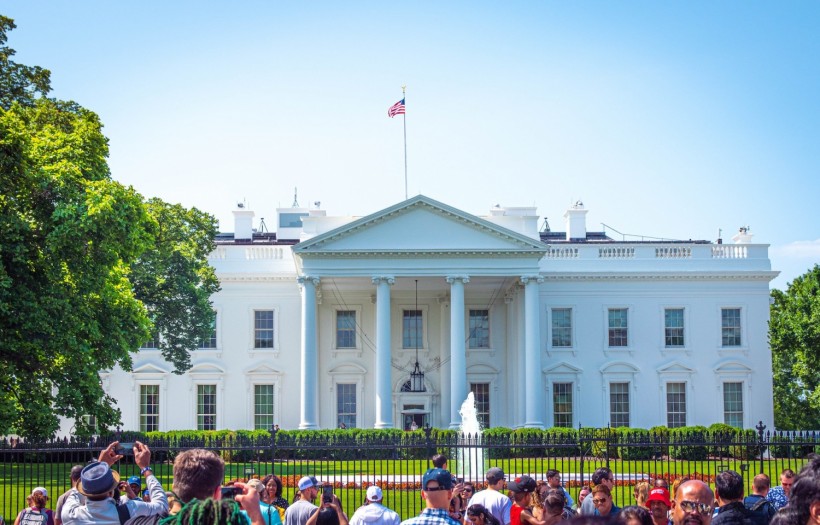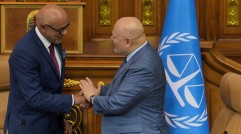President Biden Holds Discussion With Ex-College Football Stars on the Rights of Collegiate Athletes

In a landmark development that underscores the significance of the ongoing struggle for athletes' rights, President Biden, along with key White House officials, held a roundtable discussion with former college football players on Wednesday.
This dialogue marked a significant step forward in the ongoing conflict over the recognition and compensation of "student-athletes," a contentious issue that has been a bone of contention in American sports for years. According to an administration representative, the roundtable was organized with the principle that all student-athletes, including college football players, not only deserve consistent safety standards and a voice but should also benefit from the revenue they generate.
Attendees and Conversations at the Roundtable
The roundtable included notable figures such as Rod Gilmore, Desmond Howard, and Ryan Clark, who currently serve as ESPN analysts. Alongside them was broadcaster Kevin Neghandi. These personalities brought rich personal experiences from their college days, with Gilmore having been a two-sport athlete at Stanford, Clark playing safety at LSU, and Howard, the 1991 Heisman Trophy winner, playing wide receiver at Michigan.
Also present, adding to the prestige of the event, were former Stanford quarterback Andrew Luck, Jordan Meachum, a representative from the College Football Players Association and former running back at Sacred Heart and North Dakota State, and Keith Marshall, a former Georgia running back and co-founder of NIL media platform The Players' Lounge.
What was initially planned as a quick appearance by the President turned into an hour-long conversation, giving these athletes the platform to voice their concerns and perspectives. After the roundtable, Biden led the players on a brief tour of the White House, including the Oval Office, further emphasizing the importance of the event. The President, however, did not address or take questions from the press.
The Stance of President Biden on Collegiate Athlete Rights
While President Biden did not take a definitive position on controversial topics such as NIL (Name, Image, and Likeness rights) or the potential classification of athletes as employees, his support for the players was unmistakable, according to the attendees.
The President's interaction during the White House tour, listening attentively to the athletes' concerns, and the passion displayed by the invitees were seen as a positive sign of his commitment to their cause.
Director of the Office of Public Engagement, Steve Benjamin, emphasized Biden's interest in ensuring there's no significant power imbalance as football revenue continues to grow. The President was reported to be supportive when potential avenues for revenue sharing were brought up, indicating an openness to exploring various compensation structures for athletes. Despite the lack of concrete reform ideas from the White House, many view the discussions as a productive and necessary step toward future advancements.
What Does This Mean for College Football Odds?
The roundtable and the subsequent conversations have once again reignited discussions on how collegiate athlete rights will impact college football odds. As more states pass laws allowing players to profit from their name, image, and likeness, experts believe it could potentially create a recruiting advantage or disadvantage for certain schools.
Additionally, if athletes are eventually classified as employees, it could lead to a dramatic shift in the college football competitive landscape. Schools with larger budgets and resources may be able to offer more attractive compensation packages, impacting their ability to sign top recruits and potentially affecting game outcomes.
So, keep an eye on FanDuel College football odds as this dialogue continues to evolve. The landscape of college sports may be on the brink of a revolution, and it will undoubtedly impact how we bet on and view college football in the coming years.
The Future of Athlete Compensation and Unionization
While the roundtable discussion at the White House has undoubtedly brought attention to the compensation and unionization issue, concrete measures are yet to be proposed. The Biden administration and Congress may take up the matter, but with a busy legislative calendar and the upcoming presidential election, the issue might not be addressed before 2025. If President Trump returns to office, it's unclear what his stance would be on the issue.
However, there is potential for significant change through the court system. Several lawsuits are currently in progress, challenging the current status quo regarding athlete compensation. Further, a pending National Labor Relations Board ruling could potentially categorize private school athletes as employees, a move that would dramatically alter the landscape of college sports.
While the journey toward athlete compensation and unionization might be lengthy and complex, the dialogue initiated by the Biden administration represents a crucial first step. It sets a precedent of engaging directly with athletes and acknowledging the need for reform, which may pave the way for more equitable treatment of collegiate athletes in the future.
Subscribe to Latin Post!
Sign up for our free newsletter for the Latest coverage!
* This is a contributed article and this content does not necessarily represent the views of latinpost.com













